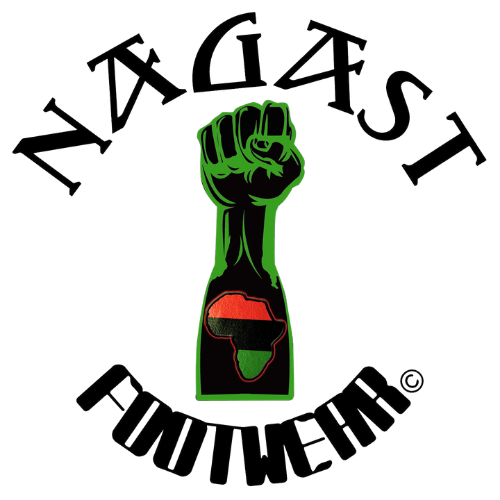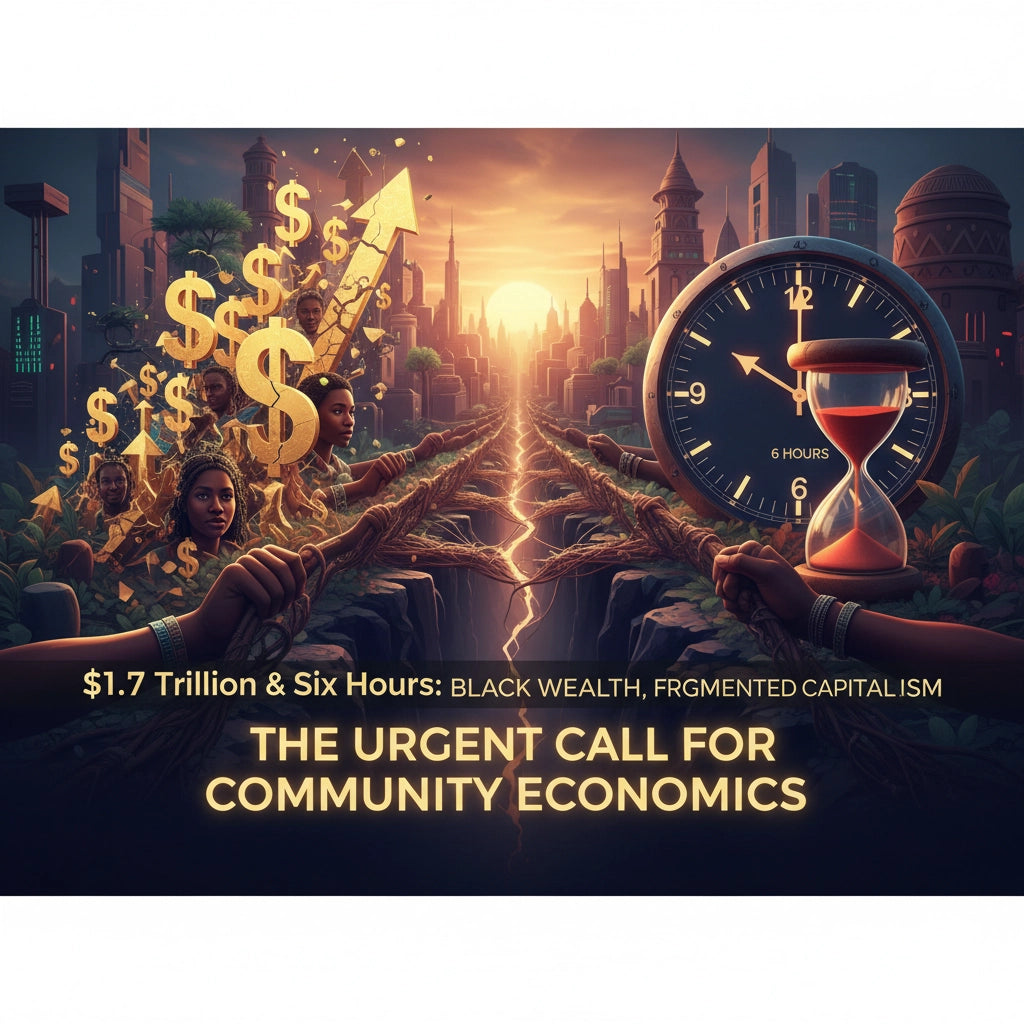
$1.7 Trillion & Six Hours: Black Wealth, Fragmented Capitalism, and the Urgent Call for Community Economics
Share
Let's talk real talk for a minute. We got $1.7 trillion in buying power as Black Americans. Trillion. With a T. That's more economic muscle than most entire countries. But here's the kicker, that money disappears from our communities faster than a sneaker drop sells out. We're talking six hours, family. Six hours.
While other communities hold onto their dollars for weeks, sometimes months, building wealth hand over fist, we're out here running a financial relay race where we keep dropping the baton.
The Numbers Don't Lie: We're Economic Giants Living Like We're Broke
The Federal Reserve laid it out plain as day in their 2022 Survey of Consumer Finances: 54% of Black families have less than $800 in savings. Read that again. More than half of us couldn't cover a basic emergency without going into debt or asking family for help.
Meanwhile, we're collectively spending $1.7 trillion annually. That's real economic power right there, the kind that built entire industries and made fortunes for everybody except us.

Compare that to our counterparts:
- Asian American families: Median savings of $8,200
- White families: Median savings of $4,500
- Jewish communities: Studies show money circulates 19-20 times within the community before leaving
- Black families: That $800 we mentioned, gone in 6 hours
The Economic Policy Institute broke it down even further. While we represent 13.4% of the population, we hold only 2.6% of total U.S. wealth. That's not just a gap, that's a canyon.
The Six-Hour Exodus: Where Our Money Goes to Die
Here's where it gets painful. According to Nielsen's extensive research on Black consumer habits, Black dollars circulate in our communities for an average of 6 hours. Six. Hours.
Jewish communities? Their money stays local for 19-20 days. Asian communities keep theirs circulating for weeks. Even in predominantly white suburban areas, consumer dollars bounce around local businesses 6-20 times before heading elsewhere.
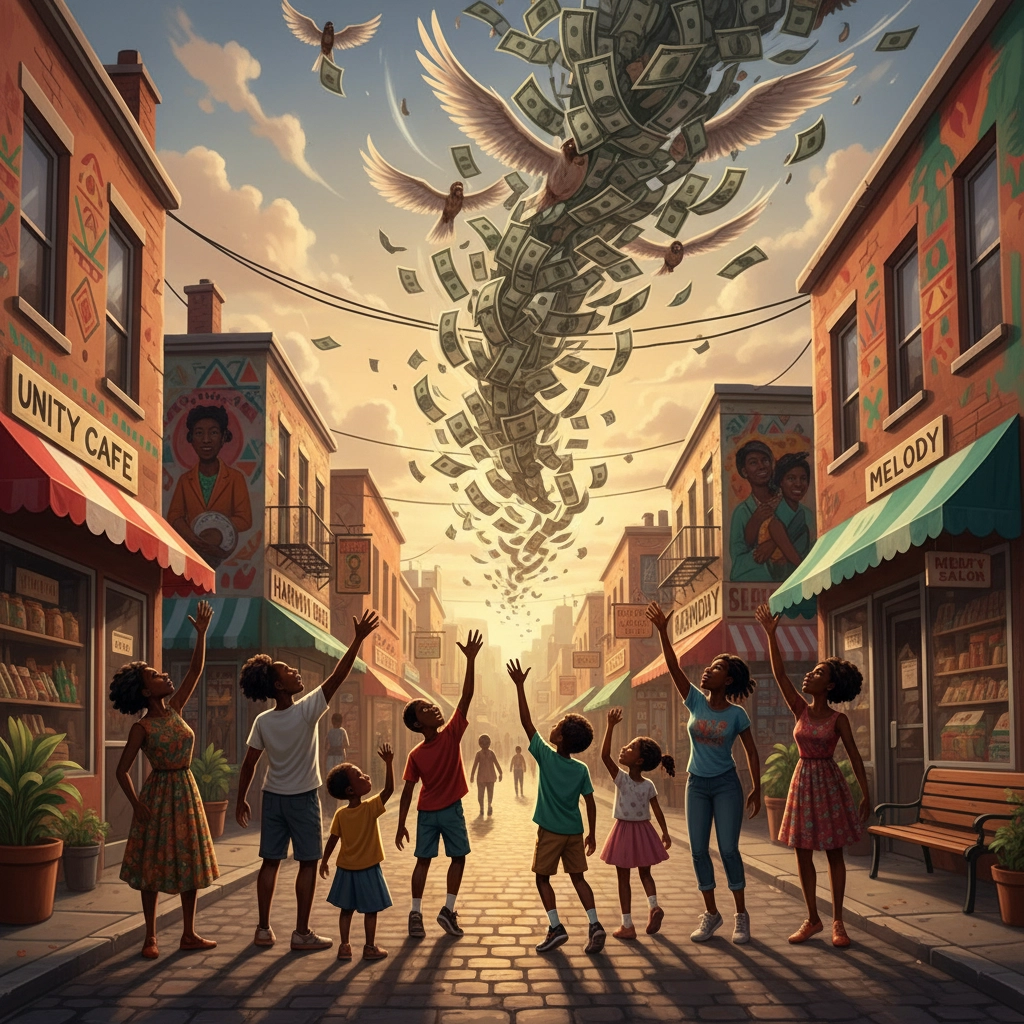
But us? We spend our money, and it's ghost. Gone to businesses that don't hire us, don't invest in our neighborhoods, and definitely don't have our backs when things get real.
Think about your last shopping trip. How many Black-owned businesses did you hit up? How much of your grocery money, your clothes budget, your tech purchases stayed in the community? If you're honest, probably not much.
The Permanent Underclass Warning: They Said It, Not Me
The Institute for Policy Studies and Prosperity Now released a report that should've been a wake-up call heard 'round the world. They projected that by 2053, yeah, just 30 years from now: median Black household wealth will hit zero. Zero, family.
The "Road to Zero Wealth" study laid out the timeline:
- 2019: Median Black wealth at $17,600
- 2031: Projected to drop to $12,000
- 2053: Complete wealth elimination
Meanwhile, white median wealth is projected to grow from $171,000 to $174,000 during the same period.
The Brandeis University study on racial wealth gaps put it even more bluntly: without dramatic intervention, Black Americans are headed toward becoming a "permanent underclass": economically isolated and dependent.

How Other Communities Lock In Their Wealth
Let's study the playbook, because other groups didn't get wealthy by accident:
Korean Americans: The "kye" system: rotating credit associations where community members pool money to fund businesses and homes. Result? Koreatown in LA generates over $3 billion annually.
Jewish Communities: Strong emphasis on supporting Jewish-owned businesses, banks, and investment funds. The Jewish community's economic solidarity helped build entire industries from entertainment to finance.
Italian Americans: Used community-based lending and business partnerships to establish strongholds in construction, food service, and real estate.
Chinese Communities: Tontines and community credit systems that keep money local and fund the next generation's education and business ventures.
Each of these groups understood something we've forgotten: economic power comes from economic cooperation.
The Fragmented Capitalism Trap
Here's the truth nobody wants to say out loud: we're practicing fragmented capitalism. We've got all the spending power but none of the ownership. We're consumers, not capitalists.
The Bureau of Labor Statistics shows Black Americans spend disproportionately more on:
- Apparel: 23% more than average
- Personal care: 18% more than average
- Housing: Often in communities we don't own
- Transportation: Cars we finance but don't manufacture
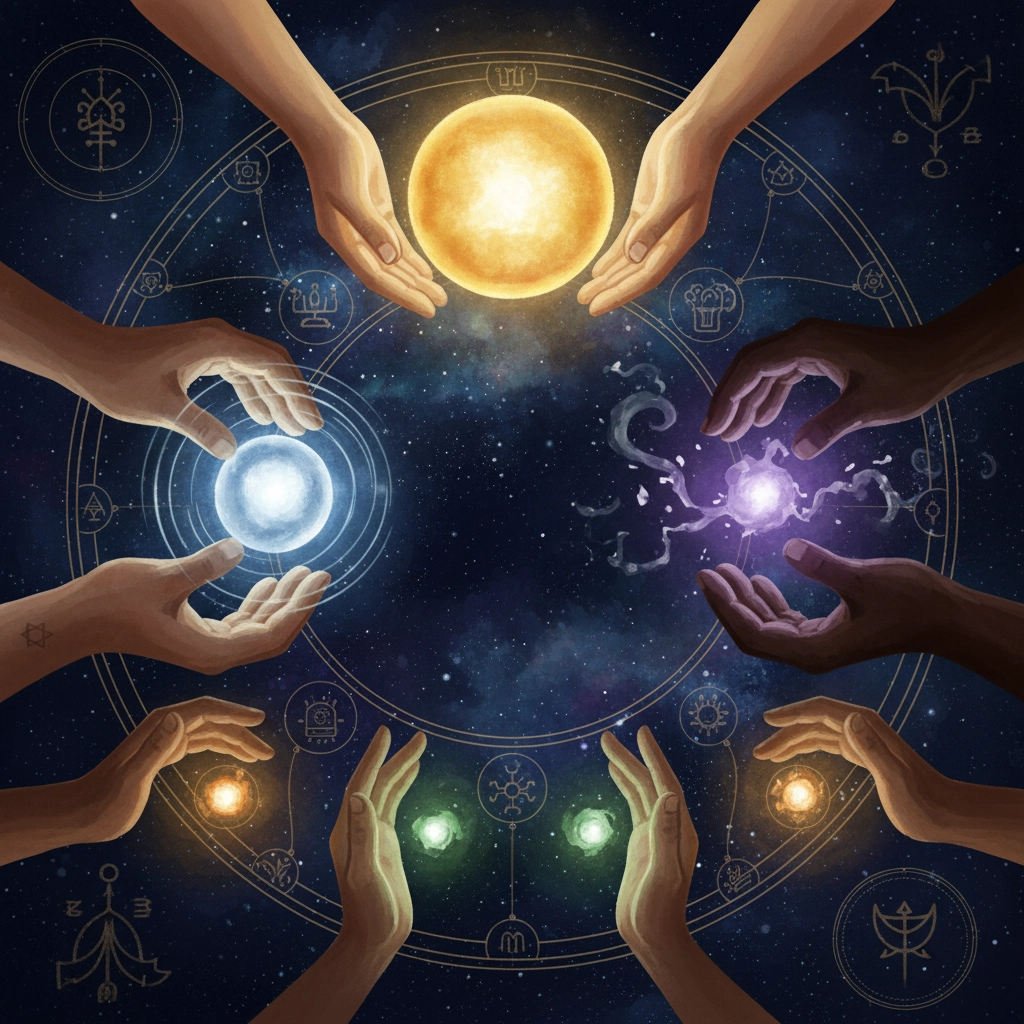
We're keeping everybody else's economy strong while ours stays weak. That $1.7 trillion is building wealth: just not for us.
Receipts: When Major Brands Disrespect Us—Again and Again
Let’s be clear, fam: these brands aren’t just “making mistakes.” They keep testing us, cashing our checks, then issuing copy‑paste apologies when we bark. Here are just a few receipts:
- Adidas: those plastic ankle chains on the Jeremy Scott Roundhouse “shackle” sneaker (2012) that evoked slavery. Then an all‑white “Black History Month” Ultraboost (2019) that had to be pulled.
- H&M: a Black child in a “coolest monkey in the jungle” hoodie (2018). The world was rightfully furious.
- Gucci: that blackface balaclava sweater with big red clown lips (2019), straight out of Jim Crow caricature playbooks.
- Prada: the “Pradamalia” monkey trinkets (2018) with blackface features in the window. Backlash made them yank it.
- Burberry: a runway hoodie with a noose drawstring (2019). In a country where lynching is part of our terror history, that’s not a “fashion detail.”
- Dolce & Gabbana: racist ads (2018) that mocked Chinese culture. Different target, same playbook: disrespect the people, sell the lifestyle.
- And more of the same: Katy Perry’s shoe line pulled blackface‑look shoes (2019). Moncler caught heat for designs echoing blackface imagery. Different names, same disrespect.
Now here’s the part that stings: after the outrage cycle dies down, our people go right back. Celebs, influencers, athletes, and everyday folks keep partnering, posting, and purchasing. That’s not just forgetfulness—that’s a kind of economic Stockholm syndrome. We’re trauma‑bonding with brands that keep playing in our face.
Why we keep tolerating it (the psychology they count on):
- Generational trauma: centuries of being denied respect trains us to chase validation from the very institutions that harmed us. A logo can feel like protection, a pass.
- Scarcity + status: when ownership is scarce, status symbols become the shortcut. The brand becomes the badge that says “I made it,” even if the brand don’t love us back.
- Media conditioning: algorithms reward hype, not healing. Outrage today, new drop tomorrow. They bury the sin under a sponsored timeline.
- Parasocial pull: when your favorite hooper, rapper, or influencer rocks it, your brain reads it as safe. Celebrity co‑signs override community memory.
- Learned helplessness: after enough disrespect with no lasting consequence, some of us start believing “that’s just how it is.” So we numb up and swipe anyway.
The performative activism playbook (how they fake change):
- Speed apology, slick statement, zero structural change.
- One‑off donations and Black History Month capsules instead of permanent budget lines for Black suppliers, factories, and creators.
- “Advisory councils” with no veto power. DEI titles with no headcount, no P&L, no board seats.
- Diversity campaigns in front of the camera while the boardroom stays the same.
- Announce an audit, never publish the receipts. Announce a partnership, never share the equity.
How celebrity endorsements reset the narrative:
- A scandal hits. A few stars walk. Then bags get offered, stylists get seeded, and tunnel fits, red carpets, and videos start re‑normalizing the brand.
- The NFL iced out Colin Kaepernick, then papered over the backlash with splashy entertainment deals and halftime optics.
- Corporations cut ties with Kyrie Irving and Kanye West fast, yet the machine kept moving—inventory sold off, culture still mined. Individuals get punished; the system keeps profiting.
Complicity, not just silence (how the industry helps pacify us):
- Distraction for dollars: award shows, streaming platforms, and sports broadcasters roll out “unity” segments and branded specials right when boycotts peak—turning our anger into ad slots.
- Safe mic, censored truth: big podcasts, talk shows, and playlists host “acceptable” conversations but blacklist and shadowban voices that call for boycotts, divestment, or ownership.
- Brand babysitting: influencers get talking points after scandals—“we’re all learning,” “let’s move forward”—to cool the streets while the drop date stays on schedule.
- Quick retreats: when controversy threatens the bag, some celebs delete posts, turn off comments, issue “no politics” disclaimers, and distance themselves from collaborators who stay outspoken.
- Named receipts: Jay‑Z’s 2019 partnership with the NFL reframed protest as “entertainment and social justice” optics. Travis Scott still did the 2019 Super Bowl while Kaepernick was blackballed. Floyd Mayweather openly shopped Gucci during a community‑wide boycott. The message was clear: the bag over the boycott.
Hollywood and music as cultural gatekeepers:
- They greenlight our slang, style, and pain for profit—but sideline films, albums, and campaigns centered on Black ownership, mutual aid, and Pan‑African power.
- Festivals, playlists, and awards often elevate “edgy” aesthetics while keeping actual empowerment voices off the stage or off the algorithm.
- Gatekeeper ecosystem: the NFL, Grammys, Met Gala, fashion weeks, radio conglomerates, and major streamers will platform “safe” conversations but ice out guests who push boycotts and ownership. The machine wants our rhythm, not our rules.
Systemic silence in entertainment (why the megaphone goes quiet):
- Gatekeepers and contracts: labels, studios, leagues, and agencies bake in morals clauses, NDAs, and brand‑risk language that punish public dissent. Speak up, lose the deal. Stay quiet, keep the bag.
- Trend timing: some artists only speak when it’s safe, trending, or aligned with a campaign. The minute the algorithm cools off, so does the “activism.”
- Access economics: premieres, festival slots, playlisting, broadcast time, and playoff‑adjacent opportunities are controlled by the same corporate families tied to these brands. Call them out and watch the doors close.
- Narrative laundering: a few high‑visibility partnerships post‑scandal (capsule drops, charity concerts, halftime shows) recast the offender as “learning,” while the community’s pain gets re‑packaged as content.
Hollywood, labels, and sports profit from our culture—but not our protection:
- Our soundtracks sell their movies; our style sells their runways; our bodies sell their tickets. When the disrespect hits, the machine protects the revenue, not the people.
- Crisis play: sacrifice a spokesperson, issue a statement, keep the release calendar intact.
- Player reality: fines and suspensions can hit overnight; equitable ownership, guaranteed protections, and cultural veto power take “years of review.” That’s a choice.
Where’s the church? Power on the sidelines:
- Historically, the Black church funded movements, housed organizers, and led boycotts. Today, too many pulpits offer prayers over pain while brands sponsor programs and buy silence.
- Chasing the bag: some modern church networks court corporate partnerships, political photo‑ops, and donor class approval—echoing corporate talking points about “forgiveness” and “civility” to cool off righteous anger.
- Economic might: Black churches steward billions in annual tithes and control serious real estate. That’s leverage—if unified.
- Missed moment: coordinated “don’t buy” Sundays, banking shifts, procurement policies, and pulpit education could move millions of dollars in a weekend. Often we get food drives; we need power drives.
- Hard truth: if mega‑ministries grow platforms and budgets while brands repeat offenses, that growth is happening inside a cycle of betrayal. Silence becomes endorsement.
How entertainment and the church enable the cycle (when interests trump the people):
- Prioritizing access over accountability normalizes disrespect.
- Platforming safe narratives while muting hard truths keeps us docile.
- Trading integrity for sponsorships, stages, and grants teaches the next generation that dignity is negotiable.
- Gatekeepers—label heads, award shows, mega‑church pastors, media moguls—spin up performative outrage, short boycotts, and quick reconciliations based on profit, not principle.
How entertainment and the church reclaim real influence:
- Reject performative allyship: no more photo‑ops without policy shifts and budget shifts. Equity or exit.
- Leverage the platform: artists and pastors align on a public “no buy, no book, no stage” list for repeat offenders, with a clear path back tied to transparent benchmarks.
- Collective bargaining: coalitions of creatives and congregations negotiate supplier spend, board seats, and community investments—publish terms so the people can verify.
- Build our own: invest in Black‑owned studios, labels, leagues, streaming, factories, and retail—ownership that can’t be threatened by gatekeepers.
- Educate in plain language: teach contracts, credit, and community economics from the stage and from the pulpit—monthly, not yearly.
- Make the line bright: every leader, entertainer, and pastor must say it with their chest—are you serving liberation or feeding the system?
This isn’t about defending anybody’s missteps—it’s about recognizing a pattern:
- Our culture is the engine.
- Their brands get the equity.
- We get the apology tour and another limited drop.
What real accountability looks like (no more cosplay):
- Time‑bound targets: commit X% of annual spend to Black suppliers, manufacturers, agencies—publish quarterly progress.
- Power, not panels: Black executives in P&L roles, board seats with voting power, veto over culturally sensitive product.
- Transparent audits: independent DEI and pay‑equity audits with public reports and deadlines.
- Fair deals: co‑ownership, royalties, and IP protection for Black creatives—no more one‑season collabs that leave us empty‑handed.
- Community investment: multi‑year funding for Black schools, factories, and incubators tied to revenue, not PR cycles.
- Consequences: contract clauses that pause our support if they violate the line—no excuses.
Power moves we control right now:
- Permanent, organized economic withdrawal from repeat offenders—no clicks, no posts, no purchases.
- Replace them with Black‑owned alternatives. Make a switch list: shoes, hoodies, skincare, bank, coffee—one by one.
- Redirect 10–20% of your annual spend to Black‑owned brands and Black‑serving institutions (banks, funds, co‑ops).
- Ask your favorite celebs and influencers to move with us: equity or exit. If they won’t, mute the promo and amplify someone who will.
- Pastors and platforms: refuse sponsorships from repeat offenders and preach economic action steps—boycotts, bank moves, and Black‑owned procurement—with dates and follow‑ups.
- Keep receipts. Track who changed for real and who just changed the campaign. Publish community report cards.
Until then, we need the courage to step away, even when the hype is loud. No more bonding with our economic captors.
Takeaway:
- Radical honesty over corporate comfort.
- Economic unity over clout chasing.
- Cultural leaders: stop trading integrity for access. Draw non‑negotiable lines around Black dignity and progress.
- Make your allegiance clear: liberation or the machine—choose.
- Starve the brands that cross the line. Feed the ones that build with us. Unity, true leadership, self‑determination—now.
Breaking the Cycle: It's Time for Economic Nationalism
The solution isn't rocket science, but it does require discipline:
Buy Black First: Before you spend anywhere else, ask if there's a Black-owned option. From groceries to gas stations, from accountants to attorneys.
Bank Black: Move your money to Black-owned banks and credit unions. They're more likely to approve loans in our communities and invest in our businesses.
Invest in Us: Support Black businesses beyond just buying products. Invest in Black-owned startups, real estate, and investment funds.
Teach the Next Generation: Financial literacy isn't just about budgeting: it's about understanding wealth building and community economics.
The Nagast Way: Economics Through Culture
This is exactly why we started Nagast Footwear. We're not just selling sneakers: we're promoting a philosophy of Black economic empowerment through every step you take.
When you buy from Nagast, you're participating in circular Black economics. Your money stays in our community longer, funds more Black jobs, and builds the kind of generational wealth our ancestors dreamed about.
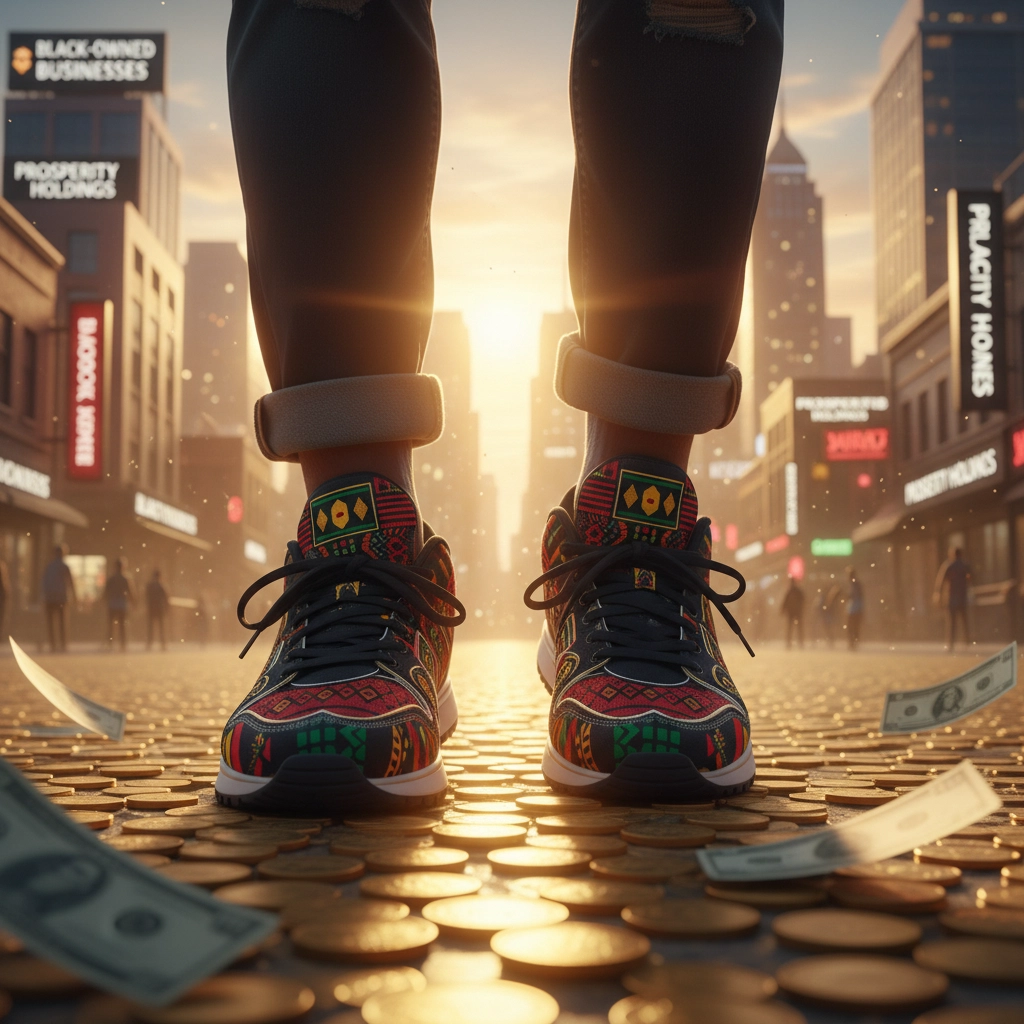
Our Pan-African designs aren't just fashion statements: they're declarations of economic independence. Every pair represents a choice to break the 6-hour cycle and start building something that lasts.
The Bottom Line: We Can't Keep Playing Small
We've got $1.7 trillion in economic firepower, but we're using it like a water gun instead of a cannon. The math is simple:
- If we kept just 10% of our spending in Black-owned businesses, we'd create 1 million new jobs
- If Black dollars circulated just twice before leaving (instead of 0.5 times), we'd double our community wealth in a decade
- If we matched other communities' savings rates, median Black wealth would jump from $17,600 to over $75,000
The choice is ours. We can keep feeding other people's economic engines while ours sputters, or we can finally use our collective power the way our grandparents dreamed we would.
The revolution starts with your next purchase. Make it count.
Ready to be part of the solution? Check out our latest collection and step into economic empowerment, one Nagast at a time.
